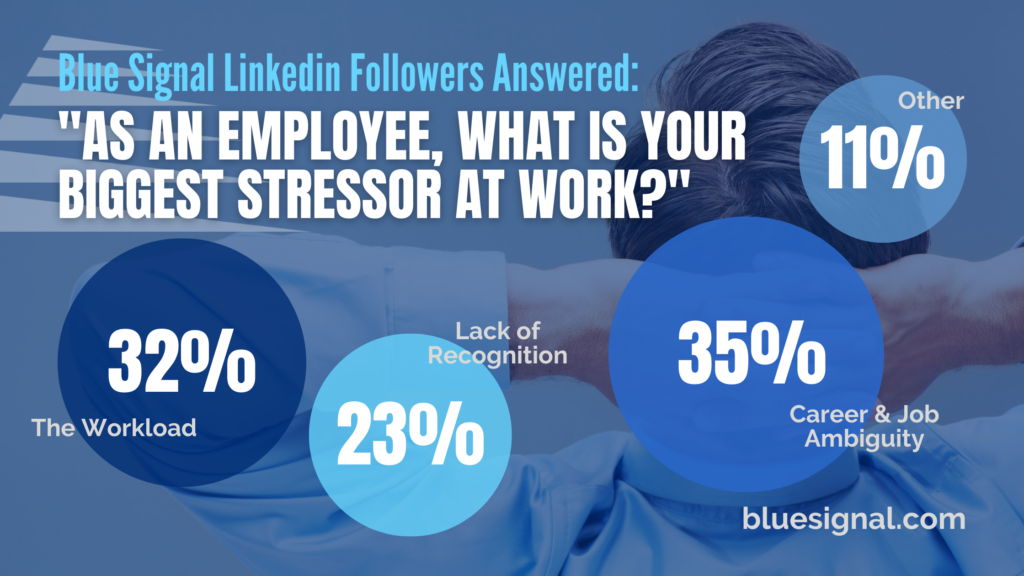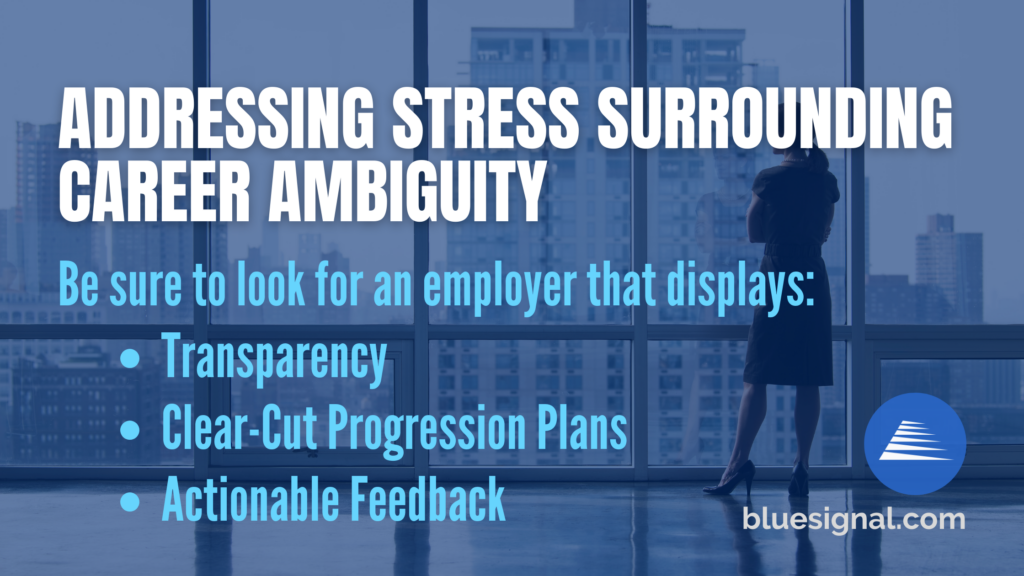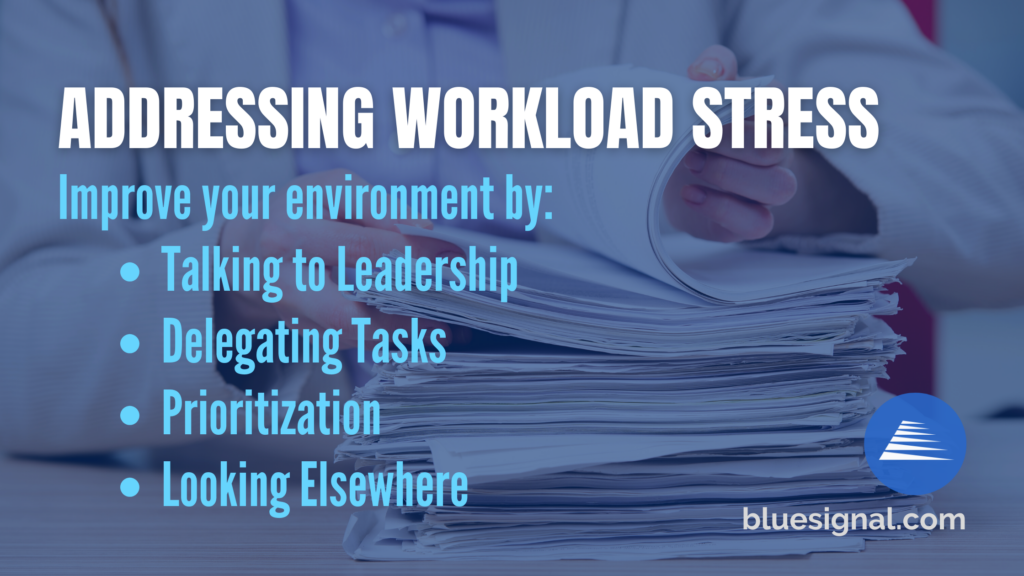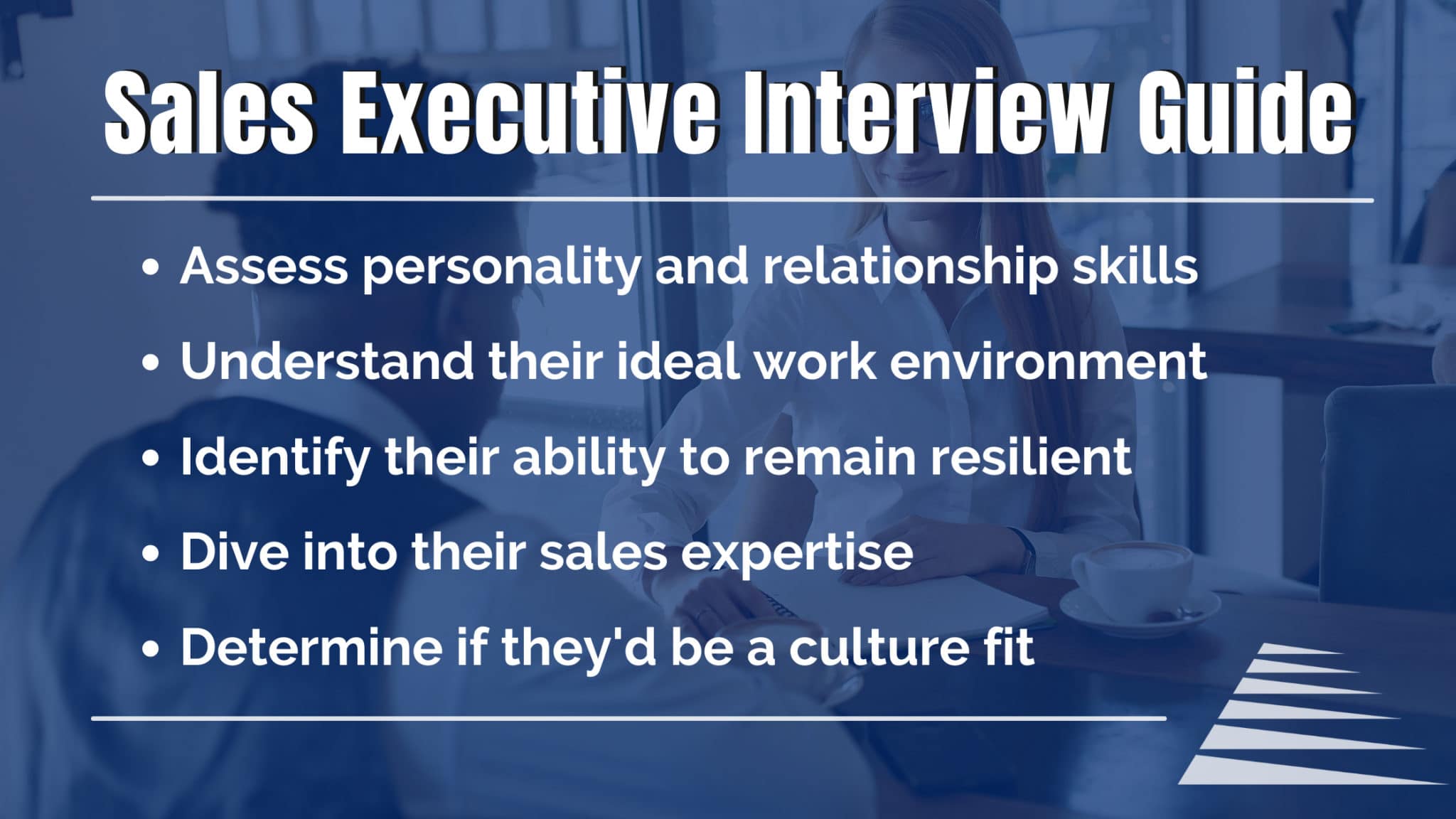Each May marks Mental Health Awareness Month, where people all over the nation join the movement to raise awareness about mental health. This recognition serves to fight stigma, provide support, educate the public, and advocate for policies that support people with mental illness as well as their families. The National Alliance on Mental Illness has dubbed 2022’s Mental Health Awareness Month’s message as “together for mental health.”
As part of the movement, Blue Signal asked our followers how their work environments and related stress impact their mental health. In 2019, the American Institute of Stress found that 83% of US workers suffer from work-related stress. More alarming, 2022’s stats revealed that 25% of workers say that their job is the #1 stressor in their lives. Our followers specifically noted career and job ambiguity, their workload, and lack of recognition as their top stressors. In this blog, we will review these stressors and discuss some of the best mechanisms for choosing and thriving within a healthy work environment.

#1 – Stress Surrounding Career Ambiguity
Due to the turbulence set in motion by the pandemic, career ambiguity and job insecurity have become prominent issues for all professionals everywhere. Even today, layoffs are commonplace and many are unsure if they could be affected next. Based on our poll results, career and job ambiguity were listed as the #1 stressor for 34% of respondents. This reflects similar findings from 2021’s AIS reports, with 52% of people saying that growth and development-related factors had a significant impact on their stress levels at work.
Although the worry is well-founded, there are ways to feel more secure in your job or career – starting with selecting the right employer. Whether you’re looking for a job today, or are re-evaluating your current situation, here is what you should look for in an employer.
Transparency
Every good employer displays some degree of transparency. Whether it’s regarding the overall performance of the company, or their plans for the future, a healthy work environment will make the status of the company’s stability common knowledge among all employees. If not, it can leave workers wondering where they stand – resulting in stress.
Clear-Cut Progression Plans
Companies should have clear-cut progression plans in place when it comes to departments, teams, and promotions. If you join a company at X level, you can expect to move up to Y, then Z after meeting pre-established criteria. If an employer doesn’t have a plan like this in place, it’s a recipe for disaster as far as career progression expectations are concerned.
Actionable Feedback
An organization’s leadership truly sets the tone for all operations. Seek out organizations that promote regular and actionable feedback from leadership – like regular one-on-one meetings. This should help affirm how to move up in the company, the importance of your role, and the overall encouragement of communication and idea sharing. The more consistent the feedback, the more stable you will feel.

#2 – Workload Stress
In a close second place, 32% of our respondents listed an excessive workload as their #1 stress factor at work. Unfortunately, this seems to be an issue that’s stood the test of time. In 2017, Statista found that 39% of workers said that a heavy workload was their main cause of stress. If this sounds familiar, here’s how you can improve that environment for yourself.
Talk to Leadership
If you are feeling overworked in your current role, you should ask for help from leadership. If you have good leaders, it shouldn’t reflect poorly on you that you want to better manage tasks. Try to come up with a solution together, whether that’s hiring more help, offloading responsibility to another less-utilized individual or department, or by streamlining processes.
Delegate Tasks
If you find yourself overworked, and you are the leadership – delegate! Handing off tasks can be difficult; many people believe that time invested in bringing someone up to speed could have been the time used to just do the task yourself. However, while training someone up on a new task can be time consuming in the short term, in the long term it will benefit your workload for the better. After all, this is what junior team members are for! Utilize them.
Prioritize
This may seem like the easy answer, but prioritizing tasks can truly have a positive impact on time management and ultimately easing your workload. Schedule out blocks of time for recurring tasks, and set the expectation with your team that you will only devote that amount of time to the task per day, week, or whatever you decide. By setting firm boundaries, but still prioritizing the right tasks, you can better manage your workload.
After completing these steps, if your employer is unable to help alleviate this workload stress, it signifies poor management on their part – that could be present in other areas of the business. In this case, it’s probably time to move on and prioritize your mental health.

#3 – Stress from Lack of Recognition
In many work environments, particularly in team settings, it can be an unfortunately common occurrence to not receive recognition for individual actions and successes. In fact, 23% of our respondents credited this lack of recognition as their main form of workplace stress. Research by Deloitte confirms this, finding that “the top driver of burnout... was lack of support or recognition from leadership.”
Therefore, in order to avoid these pitfalls in your next role, ask your interviewer how they work to recognize individual contributions to greater goals. Good employers should have programs in place that help support their workforce. Look for things like quarterly awards, awards based on something other than metrics, room for merit-based promotions, and individual recognition.
If you are in a leadership capacity today and don’t have programs like this in place – make them! Whenever a success is achieved, congratulate each individual and thank them for their personal contributions in front of the team. This will help them feel recognized, valued, and can help with retention.
Remember – leaders set the tone. To avoid stress from lack of recognition in your next role, look for leadership that puts in the extra effort to celebrate individual performance and achievements.
TLDR – What to Remember
Ultimately, every workplace is different. This list does not encompass all stressors experienced by workers, however it’s a good place to start. If you’re looking for further support and tools, the CDC has created a great set of tools for stress management in work settings that covers all the bases. Just remember and put these key indicators to practice in order to help you find and join a healthy work environment.
Whether you’re looking to make a career move due to stress, are just wanting to improve your current situation, or are seeking better ways to build up your team as a leader – working with a recruiter can help you achieve those goals. They can give insight into what it’s actually like to work for a company in your industry, and will advocate for you to land in your best situation. Blue Signal’s talent acquisition professionals are experts on spotting green flags and will get you headed on the right path to achieving workplace mental health. Reach out today to get started, and alleviate your work-based stress.

